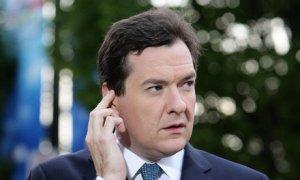Osborne’s recovery is just like Darling’s – only slower, weaker and later.
George Osborne’s crowing over the economic recovery reminded me of George W Bush, strutting around on the USS Abraham Lincoln celebrating the ‘end’ of the Iraq War on 1 May 2003. As Bush spoke, a huge banner behind him read ‘Mission Accomplished’. Shortly afterwards, all hell broke loose. The war wasn’t over after all. It’s arguable if it’s even over now.

Like Bush, Osborne is in a tearing hurry to declare victory and move on. He doesn’t want you to think too hard or too long about what victory looks like, in case you conclude that it doesn’t look much like this.
It’s not just that two quarters of growth at 0.3% and 0.7% is hardly setting the Thames on fire. It’s not just that this is the slowest recovery for a zillion years (you can take your pick how long, but we could go with the broadly pro-Osborne IEA, who say it’s the slowest for 170 years), making Osborne a less effective recovery Chancellor than Alistair Darling, Norman Lamont, Geoffrey Howe, Denis Healey, Tony Barber or even Neville Bloody Chamberlain). And it’s not just that falling living standards, spiralling house prices and frozen wages are making this recovery feel almost as bad as the disease.
There’s also Osborne’s own view on what constitutes economic recovery. You see, this is our second attempt to recover from the great slump of 2008. Our first recovery – far more promising than this one – was cancelled just as it was getting going by no other than Gideon George Osborne himself.
When Osborne moved into Number 11, the economy had grown by 0.5%, 0.4% and 1.0% in the preceding three quarters. But Osborne said that was no good. He threw out Alistair Darling’s more considered strategy – a successful strategy – and reached for his austerity blunderbuss. The economy collapsed back into recession, then drifted sideways for two years. Living standards, especially for working people, plunged.
Osborne said the Darling recovery was unsustainable because government debt was too high. He said we were on the road to becoming Greece, although how a growing economy and a level of national debt on a par with Germany’s merited comparison with Greece was, and remains, beyond me. He said the economy was too reliant on a house price ‘bubble’ and households were borrowing too much. Darling’s recovery wasn’t really a recovery at all and we’d have to start all over again.
Three years later, the economy may finally be crawling out from under the rock Osborne dropped on it. But the national debt will be £533bn higher at the next election than at the last. Osborne’s recovery has barely begun and there’s already talk of a ‘house price bubble’ in many areas. And with stagnant or falling wages, rising house prices can only be accommodated by ever-higher borrowing.
If Darling’s recovery wasn’t real, then neither is Osborne’s. And it’s three years late.
